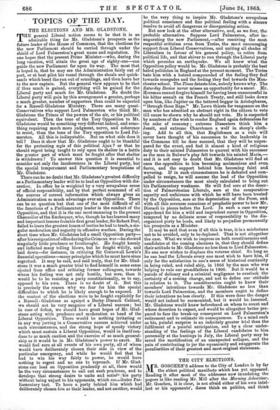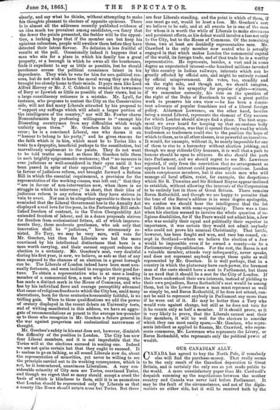THE CITY ELECTIONS.
/ R. GOSCHEN'S address to the City of London is by far .1.V_L the ablest political manifesto which has yet appeared. Reading it after most of the addresses now inundating the papers is like reading Mr. Mill after the Horning Advertiser. Mr. Goschen, it is clear, is not afraid either of his own intel- lect or his opponents', dares think on politics, and think clearly, and say what he thinks, without attempting to make his thoughts pleasant to electors of opposite opinions. There is in almost all the addresses recently published evidence of -an idea much too prevalent among candidates,—a fancy that the fewer the points presented, the feebler will be the opposi- tion, a lurking hope that if the member can but keep his -opinions colourless, people will swallow them before they have detected their latent flavour. No delusion is less fruitful of results at the poll. Occasionally indeed it happens that a man who sits for a place in which his family has a great property, or a borough in which he owns all the beerhouses, -finds it expedient to say as little as possible, lest he should perchance arouse the political conscience latent in his dependents. They wish to vote for him for non-political rea- sons, but do not wish to have the moral wrong they are doing brought too closely home to their minds. It pays men like Lord Alfred Hervey or Mr. J. C. Cobbold to remind the townsmen of Bury or Ipswich as little as possible of their views, but in a large constituency reticence is a mistake. Mr. Lyall, for instance, who proposes to contest the City on the Conservative side, will not find many Liberals attracted by his proposal to " support any suffrage which will admit a larger portion of the intelligence of the country," nor will Mr. Fowler charm Nonconformists by professing willingness to " exempt his Dissenting countrymen from any difficulties which weigh unfairly upon them." Mr. Goschen falls into no such error; he is a convinced Liberal, one who deems it an -" honour to belong to his party," and he gives reasons for the faith which is in him, which must be to Tories like a tonic to a dyspeptic, beneficial perhaps to the constitution, but marvellously unpleasant to the palate. They do not want to be told truths so hard as those Mr. Goschen tells them in such brightly epigrammatic sentences; that " no measure is ever judicious or well-considered in their eyes until it has been passed in spite of their opposition ;" that they " are in favour of judicious reform, and brought forward a Reform Bill in which the essential requirement, a provision for the representation of the working classes, was left out:" that they 4' are in favour of non-intervention now, when there is no struggle in which to intervene ;" in short, that their idea of judicious reform is any reform which they have striven in vain to avert. Nor can it be altogether agreeable to them to be reminded that the Liberal Government has in the Annuity Act displayed a real love for the poor, in the Partnership Bill estab- lished freedom of contract, in the Union Chargeability Act extended freedom of labour, and in a dozen proposals striven for freedom from ecclesiastical fetters, all of which improve- ments they, these moderate gentlemen, who ask only that innovation shall be " judicious," have strenuously re- sisted. No Tory, we may be very sure, will vote for Mr. Goschen, but then the Liberals are but the more convinced by his intellectual distinctness that here is a man worth carrying, and their earnest support reduces the election to a certainty. Mr. Goschen's seat, very doubtful during his first year, is now, we believe, as safe as that of any man exposed to the chances of an election in a great borough can be. The Liberals of London indeed have been most unu- sually fortunate, and seem inclined to recognize their good for- tune. To obtain a representative who is at once a leading member of a commercial firm, a man who is yet young, who has made a distinct mark in the House of Commons, and who has by his individual force and courage perceptibly advanced that cause of religious freedom to which the City has, amid many aberrations, been for three centuries honourably faithful, is no trifling gain. When to these qualifications we add the power of oratory displayed in the recent debate on University tests, and of writing manifested in this address, we have an aggre- gate of recommendations as patent to the average ten-pounder 418 to those who recognize in Mr. Goschen a future general in the war against pauperism and ecclesiastical narrowness of thought.
Mr. Goschen's safety in his seat does not, however, diminish the difficulty of the position in London. The City has now four Liberal members, and it is not improbable that the Tories will at the elections succeed in seating one. Indeed we are not quite certain but that they ought to succeed. It is useless to go on talking, as all sound Liberals now do, about the representation of minorities, yet never be willing to see the principle carried out to its working consequence, which is tint, be it remembered, unanimous Liberalism. A very con- siderable minority of City men are Tories, convinced Tories, and though we regret that so many should accept a creed the basis of which is blindness to facts, still it is as anomalous that London should be represented only by Liberals as that a county like Essex should return none but Tories. Bat there
are four Liberals standing, and the point is which of them, if one must go out, would be least a loss. Mr. Goschen's seat we believe to be safe, and at all events he is one of the men for whom it is worth the while of Liberals to make strenuous and persistent efforts, as his defeat would involve a loss not only to the City, but to the House of Commons. Of the remaining three, two at least are decidedly representative men. Mr. Crawford is the only member now seated who is actually engaged in that which makes London the commercial capital of the world, its foreign trade, and of that trade he is a worthy representative. He represents, besides, a vast and in some degree an unprotected interest—the hundred millions invested by this country in Indian railways, interests which can be greatly affected by official acts, and might be entirely ruined by official misgovernment. Ho votes, too, steadily and on the right side, and though not, we should imagine, very strong in his sympathy for popular rights—witness, if we remember correctly, his vote on the question of the right of the Duke of Buccleuch to spoil a great public work to preserve his own view — he has been a consis- tent advocate of popular franchises and of a liberal foreign policy. Alderman Lawrence, on the other hand, besides being a sound Liberal, represents the element of City success for which London should always find a place. The best argu- ment we ever heard for keeping up that anomalous body the City Corporation, was that it opened the only road by which tradesmen as tradesmen could rise to the position the hope of which to them, as to all other classes, is so powerful an incentive. It would, for example, without it, be nearly impossible for one of them to rise to a baronetcy without election jobbing, and though we may ridicule City honours, it is well that a path to honour should be open to citizens. So also should the path into Parliament, and we should regret to see Mr. Lawrence rejected, if only from the conviction that no arrangement so opposed to local interest could permanently continue. London needs conspicuous members, but it also needs men who will manage all local affairs, resist, for example, the despotisms which Sir R. Thwaites and Sir Richard Mayne appear inclined to establish, without allowing the interests of the Corporation to be entirely lost in those of Great Britain. There remains Baron Rothschild, and though we are happy to perceive that the tone of the Baron's address is in some degree apologetic, we confess we should hear the intelligence that the lot had fallen on him with some equanimity. There was a time when his election seemed to involve the whole question of re- ligious disabilities, for if the Peers would not admit him, a Jew who was socially their equal and politically their superior in importance, it was certain they would not admit anybody who could not prove his nominal Christianity. That battle, however, has been fought and won, and race has ceased, ex- cept in Scotland—where we believe the election of a Jew would be impossible even if he owned a county—to be a Parliamentary disqualification. For the rest, the Baron is not a valuable member, attends very infrequently, never speaks, and does not represent anybody except those quite as well represented by Mr. Goschen. It is well perhaps, that in a country in which the plutocracy have such power, the foremost man of the caste should have a seat in Parliament, but there is no need that it should be a seat for the City of London. If the Peers understood their own interests, instead of yielding to their own prejudices, Baron Rothschild's seat would be among them, but in the Lower House a man must represent as well as simply be, and Baron Rothschild, if he does not attend, can- not be said to represent anybody in Parliament any more than if he were out of it. He may be better than a Tory who would vote against change, but still as he does not vote for it he counts only as half a member. If it should prove, as it is very likely to prove, that the Liberals cannot seat their four members, it wilt be well for the electors to consider which they can most easily spare,—Mr. Goschen, who repre- sents intellect as applied to finance, Mr. Crawford, who repre- sents commerce, Mr. Lawrence who represents the Livery, or Baron Rothschild, who represents only the political power of wealth.































 Previous page
Previous page